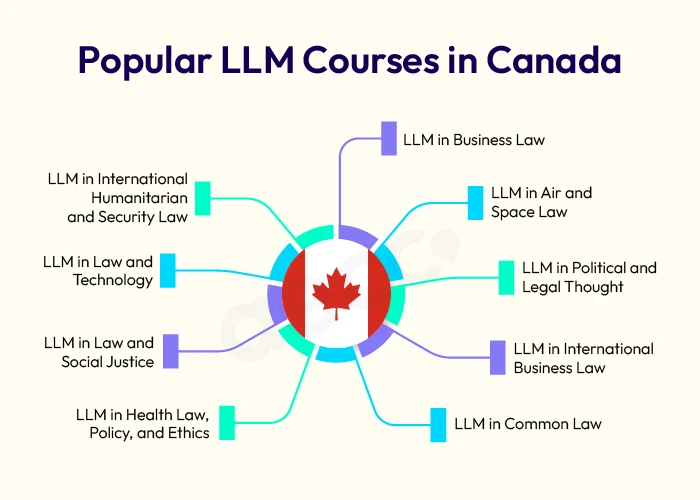Pursue Your LLM in Canada:
Advance Your Legal Career
Learn everything you need to know about Studying LLM
in Canada and get end-to-end expert guidance from us.

Pursue Your LLM in Canada: Advance Your Legal Career
Learn everything you need to know about Studying LLM in Canada and get end-to-end expert guidance from us.

LLM in Canada for Indian Students
For Indian students aspiring to advance their legal careers, pursuing an LLM in Canada offers many opportunities. The presence of many Canadian universities among the top 100 globally for law and legal studies reflects the country's steadfast commitment to delivering high-quality legal education, which should serve as a source of inspiration.
An LLM in Canada equips students with essential expertise in business law, international law, and human rights, preparing them for success in today's competitive job market.
Choosing to pursue an LLM in Canada is an exceptional option for Indian students seeking to enhance their legal skills on a global scale, given the outstanding education system, specialised programs, and affordable tuition rates available in the country.
Why Choose Canada for Your MBA Program?
Canada is home to several top-ranking universities for law and legal studies, with eight of them ranked among the top 100 globally. An LLM degree from a Canadian university holds significant international recognition, providing abundant professional opportunities.
Also, pursuing an LLM in Canada is remarkably affordable, with annual costs ranging from CA$9,000 to CA$46,000. Additionally, many universities provide financial aid and scholarships, making studying in Canada more accessible.
Upon completing your LLM, you can apply for a work permit to start working in Canada and gain valuable professional experience.
Popular LLM Courses in Canada
Below are popular LLM courses in Canada that students can opt for:

Top Law Universities/Colleges for LLM in Canada
Here are the best universities in Canada for an LLM degree:
The cost of an LLM in Canada ranges from CA$18,000 to CA$46,000 per year. Furthermore, many Canadian universities provide financial aid and grants to international students seeking a Master of Laws degree, making this country an attractive alternative for individuals wishing to further their legal education.
The cost of an LLM in Canada ranges from CA$18,000 to CA$46,000 per year. Furthermore, many Canadian universities provide financial aid and grants to international students seeking a Master of Laws degree, making this country an attractive alternative for individuals wishing to further their legal education.
Cost of Studying LLM in Canada for Indian Students
The costs associated with pursuing an LLM (Master of Laws) in Canada can vary significantly depending on the college and program.
In Canada, the average annual tuition for an LLM ranges from CA$18,000 to CA$47,000, depending on the institution and program.
When factoring in off-campus housing, the annual cost of living in Canada typically ranges from approximately CA$21,684 to CA$34,416.
Attending a prestigious Canadian institution like McGill, the University of Toronto, or the University of British Columbia for an LLM degree can cost between CA$22,000 and CA$25,000 per year.
Eligibility Criteria and Admission Process for LLM in Canada
Indian college students can successfully apply and gain acceptance into prestigious LLM programs in Canada by meeting specific requirements and following the admissions process diligently.
Eligibility Criteria:
- Most universities typically require a minimum score of 8 out of 10 (or 80%) for the LLB degree.
- Applicants must provide scores from English language proficiency tests such as PTE, TOEFL, or IELTS.
- Some universities may also consider LSAT or GRE scores as part of the admission criteria.
- Candidates need to submit a Statement of Purpose (SOP) and Letters of Recommendation (LORs) as part of the application package.
Admission Process:
- The admission process for an LLM in Canada usually involves the following steps:
- Conduct thorough research to identify schools and LLM programs aligned with your professional and educational objectives.
- Gather all required documents, including transcripts, English language test scores, SOP, LORs, and other essential materials.
- Use a centralised application portal like the Ontario Universities Application Centre (OUAC) or apply directly to the schools of interest.
- Obtain a student visa or study permit from the Canadian government if you plan to study in Canada.
- Explore scholarship opportunities and financial aid programs to support your LLM studies.
Post-Study Work Opportunities After Pursuing LLM in Canada
Here are the key employment opportunities that Indian students can pursue in Canada after completing their LLM program:
Lawyer
Legal Consultant
Legal Manager
Magistrate
Associate Attorney
Law Clerk
Solicitor
Intellectual Property Specialist
Trustee
Attorney General
Corporate Counsel
Legal Advisor in Government or Non-Profit Organisations
Academic Roles (Professor, Researcher) in Law
Depending on factors such as specialisation, location, and level of experience, the average starting salary for LLM graduates in Canada typically ranges from CA$60,000 to CA$100,000 annually. Major cities like Toronto, Vancouver, and Montreal, which have high demand for legal professionals, often offer higher salaries.
Takeaway
For Indian students considering pursuing a Master's in Law (LLM) in Canada, it presents an exceptional career pathway. Canadian law schools are renowned for offering outstanding education, often recognised globally for their exceptional legal programs and commitment to high standards in legal education and practice.
With abundant job opportunities available, LLM graduates can leverage their qualifications to secure positions in diverse sectors, including private law firms, government agencies, non-profit organisations, and international entities.
For more information regarding LLM programs in Canada, reach out to our expert counsellors at AECC today!

